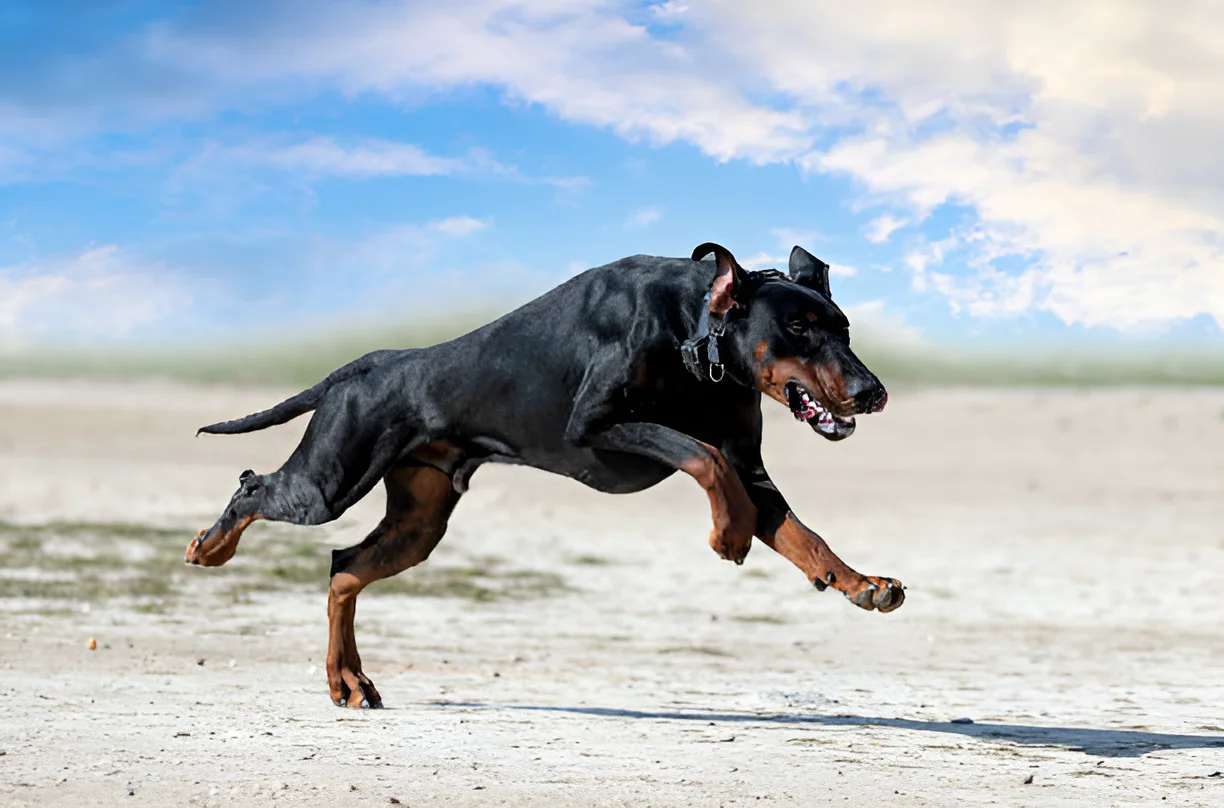No, Dobermans do not turn on their owners. They are known for their loyalty, intelligence, and protective nature, making them excellent companions when properly trained and socialized. Dobermans have long been the subject of myths and misconceptions, particularly the notion that they might turn on their owners. This comprehensive guide aims to debunk these myths, explore the true nature of Dobermans, and provide insights into their behavior, training, and care. By understanding the breed’s characteristics and needs, you can ensure a harmonious relationship with your Doberman.
The Myth of Dobermans Turning on Their Owners
Origins of the Myth
The myth that Dobermans turn on their owners likely stems from their history as guard dogs and their imposing appearance. Stories and media portrayals have exaggerated their aggressive tendencies, leading to a widespread but unfounded belief. Additionally, the myth about their brains growing too large for their skulls has contributed to this misconception, despite being scientifically debunked.
Debunking the Myth
Dobermans are not inherently aggressive towards their owners. They are bred for loyalty and protection, and their behavior is largely influenced by their upbringing, training, and environment. Like any breed, a Doberman’s behavior can be shaped positively or negatively based on how they are treated and trained.
Characteristics of Dobermans
Physical Traits
Dobermans are medium to large-sized dogs, typically standing between 24 to 28 inches tall and weighing between 60 to 100 pounds. They have a sleek, muscular build and a short coat that comes in various colors, including black, blue, red, and fawn.
Temperament and Behavior
Dobermans are known for their intelligence, loyalty, and protective nature. They are highly trainable and excel in obedience training. Their alertness and strong protective instincts make them excellent guard dogs. Despite their fearless nature, they are also gentle and affectionate with their loved ones.
Understanding Doberman Behavior
Loyalty and Bonding
Dobermans are incredibly loyal and form strong bonds with their families. This loyalty makes them protective and attentive, often leading to their nickname “velcro dogs” because they like to stay close to their owners. Their protective nature is a trait that has been selectively bred into them, making them reliable guardians.
Intelligence and Trainability
Dobermans are among the most intelligent dog breeds, ranking high in obedience and working intelligence. This intelligence makes them highly trainable, but it also means they need mental stimulation to prevent boredom and destructive behavior. Training should be consistent, positive, and engaging to keep them mentally and physically satisfied.
Protective Instincts
Dobermans have a natural instinct to protect their families and territory. This protective nature can sometimes be mistaken for aggression, but it is usually a sign of their commitment to their role as guardians. Proper socialization and training can help channel this instinct appropriately.
Training and Socialization
Importance of Early Training
Early training is crucial for Dobermans to ensure they develop into well-behaved and balanced dogs. Their intelligence and eagerness to please make them highly trainable, but they require consistent and firm guidance. Positive reinforcement techniques are particularly effective with this breed.
Socialization
Proper socialization helps Dobermans become well-adjusted and confident dogs. Exposing them to different people, animals, and environments from a young age can prevent fearfulness and aggression. Socialization also ensures they can handle the stress and demands of their protective roles.
Health and Care
Common Health Issues
Dobermans are generally healthy dogs, but they are prone to certain genetic conditions such as hip dysplasia, dilated cardiomyopathy, and von Willebrand’s disease. Regular veterinary check-ups and a healthy diet can help manage these conditions and ensure a long, healthy life.
Exercise Needs
Dobermans are active and energetic dogs that require regular exercise to stay healthy and happy. Daily walks, playtime, and mental stimulation are essential to prevent boredom and destructive behavior. They excel in activities such as obedience training, agility, and herding.
Addressing Behavioral Issues
Recognizing Signs of Stress and Anxiety
Understanding the signs of stress and anxiety in Dobermans can help prevent behavioral issues. Symptoms may include excessive barking, destructive behavior, and aggression. Addressing these issues early with training, socialization, and environmental enrichment can help mitigate them.
Professional Help
In cases where behavioral issues persist, seeking help from a professional dog trainer or behaviorist can be beneficial. These experts can provide tailored advice and training techniques to address specific problems and improve your Doberman’s behavior.
Conclusion
Dobermans are loyal, intelligent, and protective dogs that do not inherently turn on their owners. With proper training, socialization, and care, they can be wonderful companions and guardians. Understanding their needs and characteristics is key to fostering a positive and harmonious relationship with your Doberman.
The photo featured below the post headline is Credit: cynoclub/istockphoto
I hope you find this post helpful and informative. If Yes’ feel free to share it with your friends!
Frequently Asked Questions
Do Dobermans turn on their owners?
No, Dobermans do not turn on their owners. They are known for their loyalty, intelligence, and protective nature, making them excellent companions when properly trained and socialized.
Why do people think Dobermans turn on their owners?
The myth likely stems from their history as guard dogs and exaggerated media portrayals. Additionally, misconceptions about their brain size have contributed to this belief.
How can I ensure my Doberman is well-behaved?
Ensure your Doberman is well-behaved through consistent training, early socialization, and providing mental and physical stimulation.
What are common health issues in Dobermans?
Common health issues include hip dysplasia, dilated cardiomyopathy, and von Willebrand’s disease. Regular veterinary check-ups and a healthy diet are essential.
Are Dobermans good family pets?
Yes, Dobermans are loyal and affectionate, making them great family pets when properly trained and socialized.

